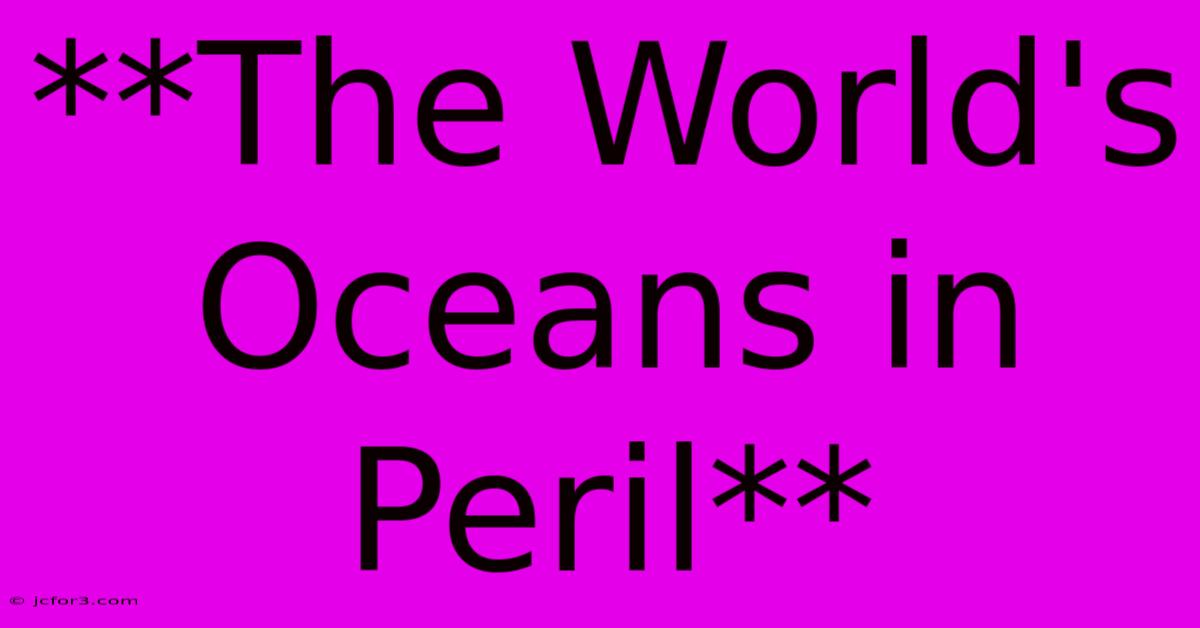**The World's Oceans In Peril**

Discover more detailed and exciting information on our website. Click the link below to start your adventure: Visit Best Website mr.cleine.com. Don't miss out!
Table of Contents
The World's Oceans in Peril: A Call to Action
Our planet's oceans, vast and teeming with life, are facing an unprecedented crisis. From rising temperatures to rampant pollution, the threats to these vital ecosystems are mounting, demanding urgent action.
The Silent Crisis: A Symphony of Threats
1. Climate Change: The ever-increasing levels of greenhouse gases in the atmosphere are warming our planet, and our oceans are absorbing the brunt of it. Ocean acidification is a direct consequence, as the ocean absorbs carbon dioxide, making it more acidic and harming marine life. This acidification weakens the shells of shellfish and coral reefs, leading to widespread ecosystem disruption.
2. Pollution: Our insatiable appetite for plastic and other pollutants has resulted in a plastic soup covering our oceans. Microplastics are ingested by marine life, leading to starvation and death. Industrial runoff, agricultural fertilizers, and sewage all contribute to nutrient pollution, creating harmful algal blooms that suffocate marine life.
3. Overfishing: Overfishing, fueled by unsustainable fishing practices, is decimating fish populations. By targeting specific species, we disrupt the delicate balance of marine ecosystems, leading to cascading effects throughout the food chain. Bycatch, the unintentional capture of non-target species, further exacerbates the problem.
4. Habitat Destruction: Coastal development, dredging, and oil and gas exploration all contribute to the destruction of vital marine habitats. Coral reefs, often called the "rainforests of the sea," are particularly vulnerable to climate change, pollution, and destructive fishing practices.
The Ripple Effect: Why We Should Care
The health of our oceans is not just an environmental concern; it's a matter of global security and economic prosperity.
- Food security: Oceans provide a significant portion of the world's protein. The decline in fish stocks threatens food security for millions.
- Climate regulation: Oceans play a crucial role in regulating the Earth's climate by absorbing carbon dioxide. The consequences of a warming ocean extend far beyond its boundaries.
- Economic vitality: Coastal tourism, fishing industries, and marine biotechnology all rely on healthy oceans. The loss of these ecosystems would have devastating economic consequences.
A Call to Action: Saving Our Oceans
The threats to our oceans are significant, but so are the solutions. Here's how we can make a difference:
- Reduce our carbon footprint: Support sustainable energy sources and reduce your personal consumption.
- Reduce plastic use: Choose reusable bags, bottles, and containers. Dispose of plastic responsibly.
- Choose sustainable seafood: Support responsible fishing practices and avoid overfished species.
- Advocate for change: Urge your elected officials to support policies that protect our oceans.
- Spread awareness: Educate others about the threats facing our oceans and inspire them to take action.
The future of our oceans depends on the choices we make today. Let us act now to protect these vital ecosystems for generations to come.

Thank you for visiting our website wich cover about **The World's Oceans In Peril**. We hope the information provided has been useful to you. Feel free to contact us if you have any questions or need further assistance. See you next time and dont miss to bookmark.
Featured Posts
-
Astana Open Live Cerundolo Vs Diallo Tv
Oct 24, 2024
-
Swanage Care Home Deaths Spark Inquiry
Oct 24, 2024
-
Dn D D D N Dd D D D Dd N D D D D D D D D D Dd N D D D D D D D D D D N D D Dd D D D D N N D Dd D Nen Ddn N N D D D D D D D D D D D D D D Ned N N Ned D N N D D D N D D D D N D Dn D D D N Dd D D N N N D D D D D D Ned Dd Dn D N N N Dn D N D D D N Dned N N N D Dd Ned D D Dd D D N D D Dd D D D D N N D D N N N D D Dn N D D D D N D D N N D D D D D D D D D D D Ned N N Ned D N N D D
Oct 24, 2024
-
Lakers Opener Redicks Playing Time Issue
Oct 24, 2024
-
Trump Fascist According To Kelly
Oct 24, 2024
